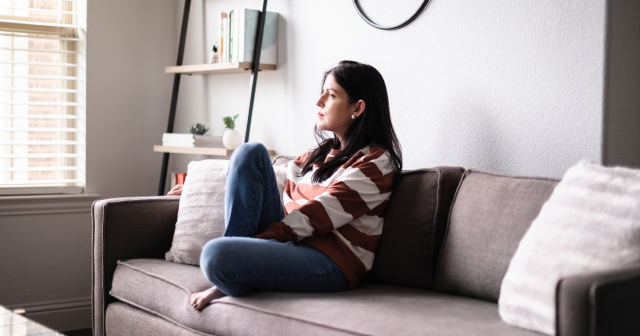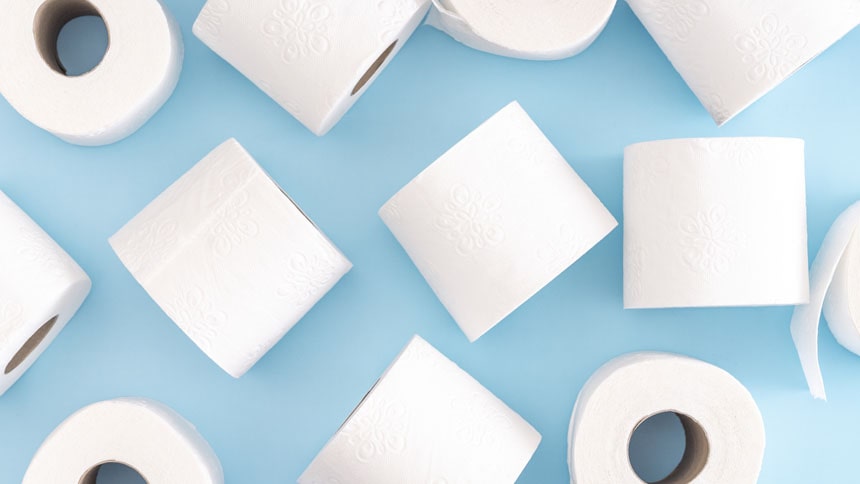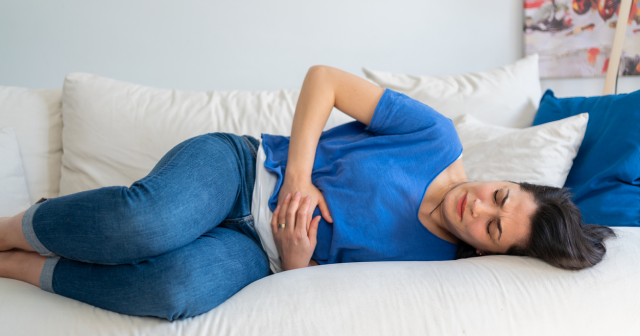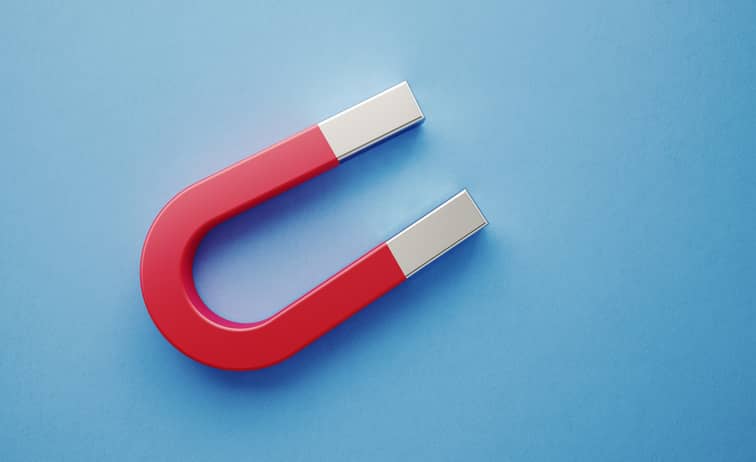What happens to your breasts during menopause?
As you get older, it’s natural for your breasts to change shape and size and become less firm. You might also find that you get sore or painful breasts, due to the hormonal changes that happen during the menopause (when you stop having periods).
Let’s look at what causes breast pain during the menopause, when to see a doctor, and what treatments are available to help you feel more comfortable.
Causes of sore breasts during menopause
Breast pain during the menopause or the time leading up to it – called the perimenopause – can be cyclical or non-cyclical. Cyclical breast pain is related to your period (menstrual cycle), while non-cyclical breast pain isn’t.
There are a few possible causes of sore breasts during the menopause and perimenopause.
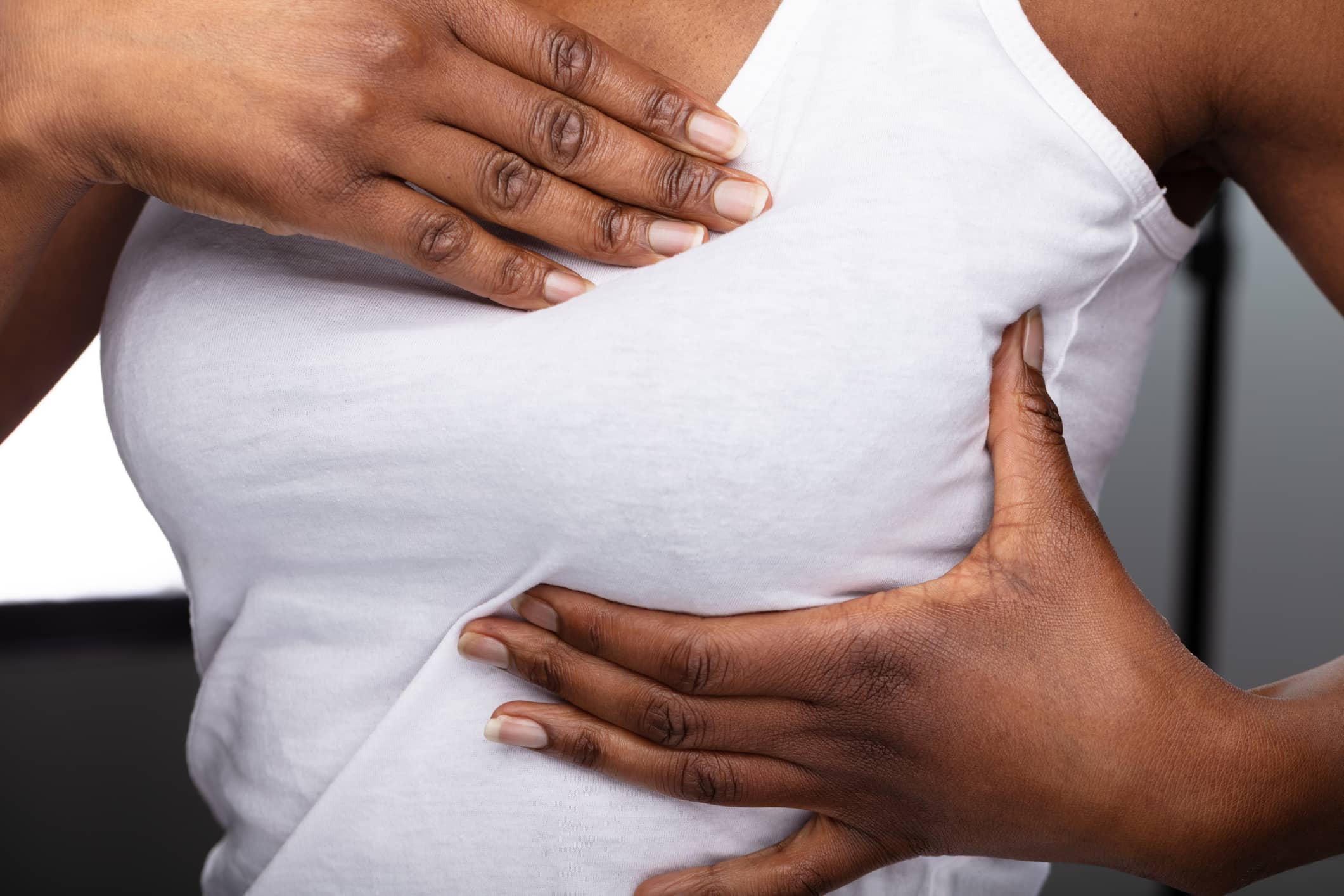
Hormonal changes
Sore or painful breasts are common during the menopause because of the changing levels of hormones in your body. Your ovaries stop producing as much of the hormone oestrogen and don’t release an egg every month, so you don’t have a period.
Once you’ve gone 12 months without a period, any pain or soreness in your breasts should go away.
When you’re still getting periods, during the perimenopause, breast pain can also be due to the changing levels of oestrogen and progesterone in each menstrual cycle. Known as fibrocystic changes, this can make your breasts feel sore and lumpy. But it’s rare after you've been through the menopause.
You might also find you get itchy skin during the menopause, including itchy breasts. Again, this is due to changing levels of oestrogen.You should see a doctor if you notice any skin changes or rashes on your breasts, particularly if it's only on one, to check if an underlying breast problem could be causing it.
Read more about the menopause and itchy skin.
Medication
Painful or sore breasts can also be caused by some medications. Types of medication that can cause breast pain include:
- hormone replacement therapy (HRT)
- contraceptive pills
- antidepressants
- antibiotics
- antipsychotic medication
- medication for heart conditions
Mastitis
Mastitis is a condition that can cause breast pain. You might notice a swollen, red area on your breast, which feels tender and warm (inflamed).
It’s common if you’re breastfeeding, but can also happen at other times, around childbirth, or after an injury or surgery.
It’s important to get this checked by a doctor, especially if you’re not breastfeeding, as a rare type of breast cancer can cause similar symptoms.
When to see a doctor about sore breasts
Most breast pain or soreness isn’t anything serious, and can usually be treated at home or with medicines prescribed by your doctor.
However, there are some warning signs to look out for. Rarely, pain in your breast can be a sign of a heart attack. Call an ambulance if you have breast pain and any of the following:
- chest pain – a tightness, squeezing, or feeling of pressure in the middle of your chest
- pain in other parts of your body – it can feel like pain is moving from your chest to your arms, neck, jaw, back and tummy
- dizziness or lightheadedness
- shortness of breath
- sweating
- feelings of sickness (nausea) or sickness (vomiting)
- coughing or wheezing
- an overwhelming feeling of anxiety – similar to a panic attack
You should see a doctor about breast pain if:
- it doesn’t get better, or painkillers don’t help
- you have a high temperature, or you feel hot or shivery
- your breast is red, swollen or hot
- you have a lump on your breast that is very painful
- you have a hard lump on your breast that doesn’t move
- you have a lump in your armpit
- one or both of your breasts change shape
- you have nipple discharge, especially if it’s bloody
- you have a rash or changes to the skin on your breast or around your nipple
- your nipple has sunk into your breast
- there’s a history of breast or ovarian cancer in your family
Treatment for sore breasts and nipples
Treatment for breast pain depends on the cause, so it’s important to speak to your doctor if you have soreness that doesn’t go away. But there are a few treatment options for breast pain or soreness.
Painkillers
Simple, non-prescription painkillers can be very helpful for treating breast pain. These include tablets such as paracetamol and ibuprofen, and anti-inflammatories you apply to the skin in the form of a cream, gel or lotion. Speak to your pharmacist or doctor for advice on how to safely get and use these medicines.
Prescribed medications
If the soreness doesn’t get better on its own or with the help of simple painkillers, your doctor might prescribe stronger medication in the form of tablets or injections, depending on the cause of your pain.
If you have mastitis, depending on the cause, your doctor may prescribe antibiotics. Avoiding tight-fitting bras and using a warm compress can also help. If you’re breastfeeding, you should continue to breastfeed, express between feeds and massage your breast to clear any blockages.
You should tell your doctor if your symptoms don’t get better 48 hours after taking antibiotics.
Self-care
Making sure your breasts are supported can help ease breast pain. Try wearing a supportive, well-fitted bra during the day, a more supportive bra during exercise and a soft support bra at night.
Natural remedies
Some people find natural remedies helpful for sore breasts, but there isn’t much evidence that they work. It’s best to speak to a doctor before trying a natural remedy, to check that it won’t affect any other medication you’re taking, or make your symptoms worse.
Your health questions answered
Does menopause increase breast size?
Answered by: Healthily's medical teamGetting older and going through the menopause causes many physical changes, and this often includes a decrease in breast size. You might find that your breasts shrink by a cup size. However, they can also get bigger if you put on weight during the menopause, or if you’re taking HRT, which can cause breast swelling.
Key takeaways
- it’s common to get breast pain during the menopause
- changes in oestrogen levels are the main cause
- sore breasts can also be due to taking certain medications, or mastitis
- if the pain doesn't go away, you should see your doctor
- common treatment options include simple painkillers and prescribed medication




